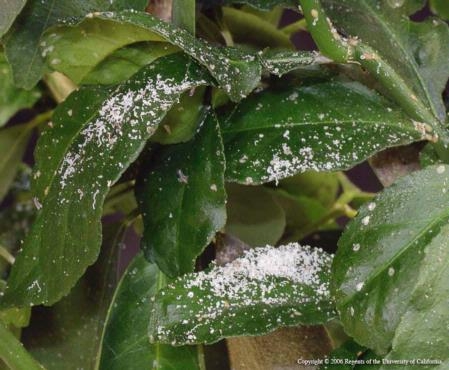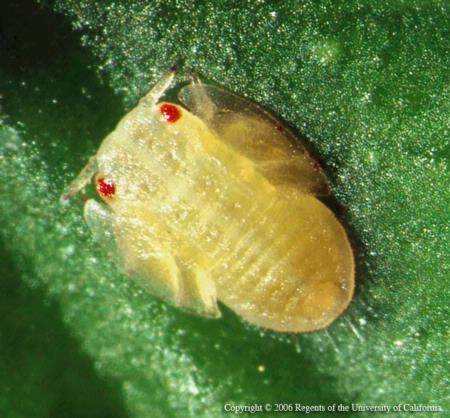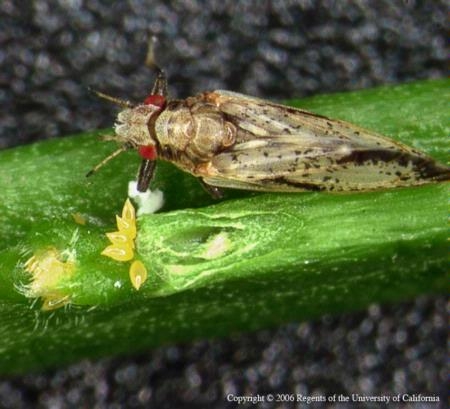- Author: Chris M. Webb
Today we share a recent press release. The Ventura County Master Gardeners are working hard to educate home gardeners about the Asian citrus psyllid and the deadly bacterial disease it carries.
Residents of Ventura County are asked to be on the lookout for a tiny insect that could wipe out California’s citrus industry — and with it, every lemon, lime, orange, grapefruit and mandarin tree in every urban and suburban yard.
This tiny insect, known as the Asian citrus psyllid (SIL-lid), carries a bacterial disease that is harmless to humans but inevitably fatal to all varieties of citrus. There is no treatment or cure. The disease has already destroyed millions of trees in citrus-producing regions around the world, including Florida.
The pest has been found in San Diego, Imperial, Orange and Los Angeles counties, and is expected to reach Ventura County this year. The disease is not far behind — infected trees have been found in western Mexico, and the disease is moving steadily closer to California.
The only way to stop this plague is to quickly find and kill the insect pest whenever it reaches a new area. If you have citrus trees in your yard, inspect them often. The insect feeds on the new leaves and stems of all citrus varieties. Twisted, stunted new growth is a sign your tree may be infested by the psyllid, which looks like a small, brown grain of rice. You may also notice the tiny nymphs feeding on tender young growth. Look for sticky white secretions, like honeydew, or sooty mold clinging to the leaves.
If you think you have spotted this invasive pest in your trees, report the sighting immediately by calling 1-800-491-1899.
For more information about the pest and the disease it carries, call the Ventura County ACP-HLB Task Force at 805-535-8641, or visit their Facebook page.
- Author: Chris M. Webb
A team of scientists from the Agricultural Research Service of the U.S. Department of Agriculture and the University of Florida’s Indian River Research and Education Center are studying the use of periwinkle (Catharanthus roseus) to fight Huanglongbing (HLB). HLB is a bacterial disease that threatens citrus crops worldwide. The bacteria is spread by the Asian Citrus Psyllid.
The scientists infect the periwinkle plants with HLB and then run experiments on the diseased plants in an effort to find a way to return the plants to good health. They have used nutrient and soil treatments to regenerate infected plants and have placed cuttings in chemical compounds to search for HLB treatments.
Further information on this research and more can be found in the May 2010 edition of the Topics in Subtropics Newsletter on our website.

Yellowing leaves is one symptom of HLB

Periwinkle shows promise for solutions
to problems caused by HLB
- Author: Chris M. Webb
There is much community and grower support to stop the Asian Citrus Psyllid (ACP) from becoming established in Ventura County. While it has not yet been identified in our county, it is very close. An ACP was found recently in Van Nuys.
This is an extremely dangerous pest because it can carry the vector for the disease, Huanglongbing (HLB, also known as citrus greening), that destroys citrus trees, orchards and related industries in locations were ACP becomes established.
Invasive pests and disease, such as the ACP/HLB pest-disease complex negatively affect agricultural productivity, public health, natural resource biodiversity and our own backyards.
Thank you all for your support. Please contact our office if you would like hard copy outreach materials for yourself or for groups.
- Author: Chris M. Webb
The Asian Citrus Psyllid (ACP) continues its advance through Southern California. This is an extremely destructive pest. The disease it carries is capable of destroying citrus trees, orchards, and related industries.
An ACP Task Force has been formed in Ventura County. Top priority is to reduce the spread of the psyllid, which in turn will reduce the spread of disease. Your help is needed to stop this pest. You can help in the following ways:
- Do not bring citrus trees, other plants, or fruit into the state from other counties, states, or countries.
- If you have citrus on your property, please check regularly (at least monthly) for signs of infestation. Details on what to look for can be found here.
- Encourage your friends, neighbors and relatives to do the same
- A suspected ACP infestation should be reported immediately to the CDFA hotline at 800.491.1899, or your county agricultural commissioner. The Ventura County Agricultural Commissioner can be reached at 805.933.2926
The Ventura County ACP-HLB task force will be conducting a workshop on February 25, 2010 designed for growers and pest-control advisors. More information about the workshop can be found here.
Our office has outreach materials available to help spread the word. Please contact us if you would like some.


Psyllid eggs and nymphs tucked into crevices and folds.

Asian Citrus Psyllid nymph

Asian Citrus Psyllid adult
- Author: Chris M. Webb
There have been two earlier posting on this blog about the Asian Citrus Psyllid (ACP)and the potential crippling impact for citrus in California caused by the Huanglongbing vector (aka citrus greening disease) this insect carries. Please read the Introduction to the Asian Citrus Psyllid and Asian Citrus Psyllid: Lessons from Florida for additional information about this pest.
We are entering the time of year in which the ACP becomes most active. Make sure to check your trees regularly for signs of this insect. The Introduction to the Asian Citrus Psyllid post provides detailed photos and descriptions of how to determine if this species is on your trees. If you see this psyllid, call the California Department of Food and Agriculture at 1-800-491-1899 right away.
I recently asked Ventura County UCCE Farm Advisor Ben Faber what I should share about the ACP. He said to remind people how important it is to make sure to declare plant items when crossing the border. It is people who are spreading this around.
Recently UC Agriculture and Natural Resources’ News and Information group released a video demonstrating for the general public how to detect Asian Citrus psyllids on their garden trees. The video is available at:
http://news.ucanr.org/newsstorymain.cfm?story=1233
In addition, our office has a supply of bookmarks that contain photos and instructions for identifying both ACP and trees struck by Huanglongbing. They are available in both English and Spanish. Please contact our office if you would like some.

ACP infestation

ACP feeding damage

Distorted leaves from ACP



